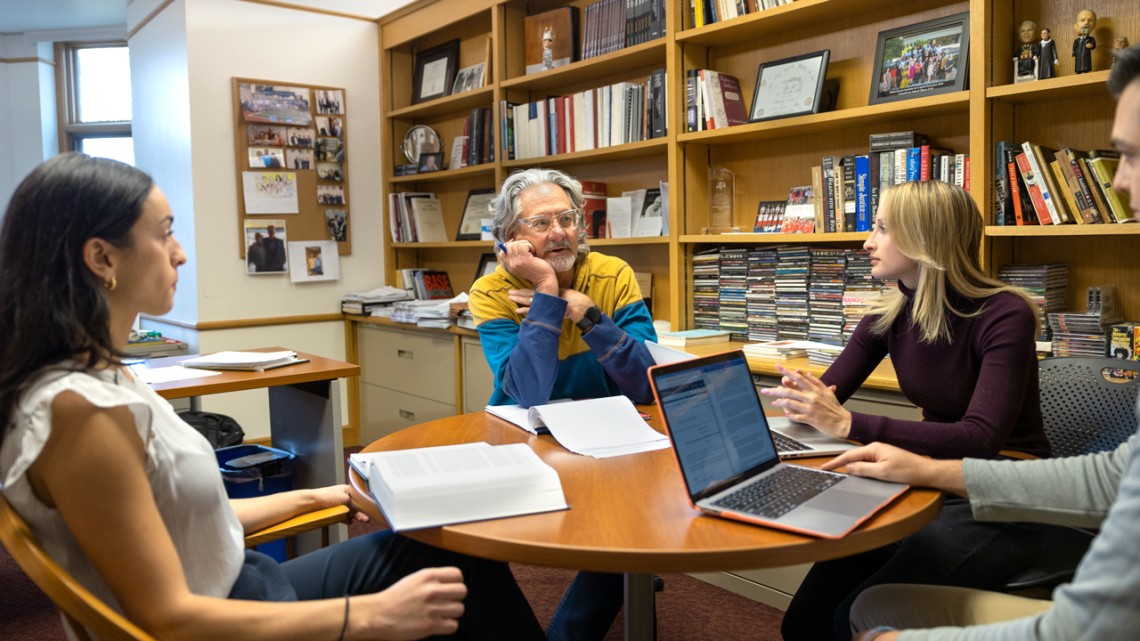
John Blume, the Samuel F. Leibowitz Professor of Trial Techniques and director of the Cornell Death Penalty Project at Cornell Law School, meets with third-year law students who have supported the challenge to South Carolina's execution methods as members of the Capital Punishment Clinic. From left to right are Emily Rivera, Elena Smalline and Nick Covek.
Law team opposes South Carolina’s electric chair, firing squad
By James Dean, Cornell Chronicle
Faculty, students and alumni affiliated with Cornell Law School’s Capital Punishment Clinic are leading a legal fight to prevent South Carolina from executing condemned prisoners by methods they argue are cruel and unusual: the electric chair and firing squad.
Last September, a circuit court judge agreed both methods violate South Carolina’s constitution, saying the state had “turned back the clock” with a 2021 law that made electrocution the default mode of execution and added the firing squad as an alternative inmates could choose, along with lethal injection.
Earlier this year, John Blume, the Samuel F. Leibowitz Professor of Trial Techniques and director of the Cornell Death Penalty Project, led oral arguments during appeals before the South Carolina Supreme Court, which has not issued a final ruling.
“I hope we have a victory on this at the end of the day, but I think this case has also sparked a larger conversation about, why are we doing this?” Blume said. “There’s no good way to kill someone, but certainly there’s no justification today for electrocuting and shooting people.”
The team representing four men on death row against South Carolina’s Department of Corrections and governor also includes Lindsey S. Vann ’05; Emily Paavola, J.D. ’05; Hannah L. Freedman, J.D. ’16; and Allison Franz ’18, J.D. ’21, all attorneys with Justice 360, a South Carolina nonprofit formerly led by Blume. Vann, the executive director, and Freedman, director of juvenile litigation and staff attorney, played lead roles in the circuit court trial last August.
Prompting their lawsuit was the General Assembly’s 2021 passage of Act 43, which sought to ease the way for executions after the Department of Corrections said it was unable to purchase lethal-injection drugs. Under the law, if the department determined – without oversight – that a prisoner’s chosen method of execution was not “available,” it could impose one of the alternatives.
That meant the state, which last held an execution in 2011, could have ordered the defendants into its more than 100-year-old electric chair, last used in 2008 but only seven times since the death penalty’s reinstatement in the U.S. in 1976, following a moratorium; or, before a three-person firing squad – a method used nationally only three times since 1976, all in Utah, most recently in 2010.
After the Department of Corrections confirmed in March 2022 that it could proceed with those methods of execution, Justice 360 said in a statement that South Carolina had become an outlier by reverting to “two antiquated, barbarous methods” with records of being botched.
The Cornell-led legal team has argued those methods are unconstitutional in several ways: because the state constitution prohibits punishment that is cruel, corporal or unusual; because Act 43 is too vague; and because the law could retroactively impose punishments harsher than lethal injection – the method each defendant has elected and that the U.S. Supreme Court has recognized as constitutional and the most humane, according to their lawyers.
A central question the Cornell-led legal team has posed: Why is lethal injection unavailable in South Carolina, while 13 states and the federal government have carried out more than 240 executions in that manner since the Department of Corrections’ current director took office in 2013?
Discovery seeking to confirm what the department has done to obtain lethal-injection drugs wasn’t permitted prior to last August’s trial, after the department said such disclosures could hinder its efforts. The Supreme Court this year ordered the circuit court to proceed with that discovery, but the process was put on hold while the General Assembly attempts to pass a law shielding the identity of companies that provide the drugs, potentially facilitating their acquisition.
If the state is successful, it’s unclear how and when the higher court might rule on the constitutionality of electrocution and firing squads. Depending on the outcome, a related challenge under the Eighth Amendment could also proceed in federal court.
The Capital Punishment Clinic’s involvement originated with advocacy on behalf of defendant Richard Moore, a Black man whose death sentence his lawyers argued was biased – recommended by an all-white jury – and disproportionate to his crime.
Over roughly five years, Blume said more than 20 clinic students have supported the legal team’s research, writing and preparation for oral arguments; practiced the analytical thinking and judgment required to prioritize clients’ best interests; and been exposed to more personal aspects of a capital punishment defense.
“The death penalty dehumanizes people,” Blume said. “One of the things the students learn is that everybody is much more than the worst thing they’ve ever done.”
The clinic has previously worked with teams that secured the releases of two inmates who spent more than 45 years combined on South Carolina’s death row: Edward Lee Elmore in 2012 and Sterling Spann in 2006.
The current case does not challenge the constitutionality of the death penalty itself, but the methods of execution. If a state chooses to enforce capital punishment, Blume has argued, it should do so in the most humane way possible.
“Having seen through this litigation what the firing squad does to a person’s body, and having myself watched someone die in the electric chair,” Blume said, “I believe that both of those methods of execution are not something that should be sanctioned by civilized society in 2023.”
Media Contact
Get Cornell news delivered right to your inbox.
Subscribe
